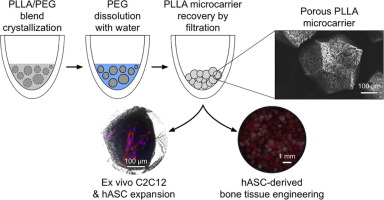Acta Biomaterialia ( IF 9.7 ) Pub Date : 2018-06-06 , DOI: 10.1016/j.actbio.2018.06.009 Mirasbek Kuterbekov , Paul Machillot , Pierre Lhuissier , Catherine Picart , Alain M. Jonas , Karine Glinel

|
Porous polymeric microcarriers are a versatile class of biomaterial constructs with extensive use in drug delivery, cell culture and tissue engineering. Currently, most methods for their production require potentially toxic organic solvents with complex setups which limit their suitability for biomedical applications and their large-scale production. Herein, we report an organic, solvent-free method for the fabrication of porous poly(L-lactide) (PLLA) microcarriers. The method is based on the spherulitic crystallization of PLLA in its miscible blends with poly(ethylene glycol) (PEG). It is shown that the PLLA spherulites are easily recovered as microcarriers from the blends by a water-based process. Independent control over microcarrier size and porosity is demonstrated, with a higher crystallization temperature leading to a larger size, and a higher PLLA content in the starting blend resulting in a lower microcarrier porosity. Microcarriers are shown to be biocompatible for the culture of murine myoblasts and human adipose stromal/stem cells (hASC). Moreover, they support not only the long-term proliferation of both cell types but also hASC differentiation toward osseous tissues. Furthermore, while no significant differences are observed during cell proliferation on microcarriers of two different porosities, microcarriers of lower porosity induce a stronger hASC osteogenic differentiation, as evidenced by higher ALP enzymatic activity and matrix mineralization. Consequently, the proposed organic-solvent-free method for the fabrication of biocompatible porous PLLA microcarriers represents an innovative methodology for ex vivo cell expansion and its application in stem cell therapy and tissue engineering.
Statement of significance
We report a new solvent-free method for the preparation of porous polymeric microcarriers for cell culture, based on biocompatible poly(L-lactide), with independently controllable size and porosity. This approach, based on the spherulitic crystallization in polymer blends, offers the advantages of simple implementation, biological and environmental safety, easy adaptablility and up-scalablility. The suitability of these microcarriers is demonstrated for long-term culture of both murine myoblasts and human adipose stromal/stem cells (hASCs). We show that prepared microcarriers support the osteogenic differentiation of hASCs, provided microcarriers of properly-tuned porosity are used. Hence, this new method is an important addition to the arsenal of microcarrier fabrication techniques, which will contribute to the adoption, regulatory approval and eventually clinical availability of microcarrier-based treatments and therapies.
中文翻译:

用于细胞培养的多孔聚L-丙交酯微载体的无溶剂制备
多孔聚合物微载体是一类通用的生物材料构建体,广泛用于药物输送,细胞培养和组织工程中。当前,大多数生产方法都需要具有潜在毒性的有机溶剂,且其设置复杂,这限制了它们在生物医学应用和大规模生产中的适用性。在这里,我们报告了一种有机,无溶剂的方法来制造多孔聚(L-丙交酯)(PLLA)微载体。该方法基于PLLA与聚(乙二醇)(PEG)混溶共混物中的球状结晶。结果表明,通过水基工艺可以很容易地从混合物中回收PLLA球晶作为微载体。证明了对微载体尺寸和孔隙率的独立控制,较高的结晶温度导致较大的尺寸,起始混合物中的PLLA含量较高,从而导致微载体孔隙率较低。已显示微载体对于鼠成肌细胞和人类脂肪基质/干细胞(hASC)的培养具有生物相容性。而且,它们不仅支持两种细胞类型的长期增殖,而且还支持hASC向骨组织的分化。此外,虽然在两种不同孔隙度的微载体上的细胞增殖过程中未观察到显着差异,但孔隙率较低的微载体诱导了更强的hASC成骨分化,这由较高的ALP酶促活性和基质矿化所证明。所以,
重要声明
我们报告了一种新的无溶剂方法,该方法基于生物相容性聚(L-丙交酯),具有可独立控制的大小和孔隙率,用于制备用于细胞培养的多孔聚合物微载体。该方法基于聚合物共混物中的球状结晶,具有实施简单,生物学和环境安全,易于适应性和可扩展性的优点。这些微载体适用于鼠成肌细胞和人类脂肪基质/干细胞(hASC)的长期培养。我们显示,准备的微载体支持hASCs的成骨分化,只要使用适当调节的孔隙度的微载体即可。因此,这种新方法是对微载体制造技术的重要补充,这将有助于微载体制造技术的采用,


























 京公网安备 11010802027423号
京公网安备 11010802027423号